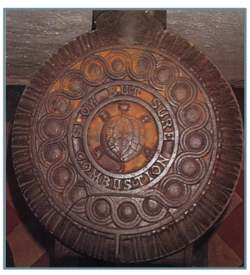Tortoise stove

The slow burner that was made for well over a hundred years — Charles Portway’s Tortoise stove.
The Tortoise stove dates from 1830, when the first was hand-built by Charles Portway to heat his ironmongery store in Halstead, Essex. After making a second stove for a neighbour, Mrs Portway suggested he go into business manufacturing and selling them, so he established a small foundry and went to work. This proved so successful that in the next 50 years over 17 000 of his stoves were sold and provided low-cost and economical heating to many thousands of people. A solid-fuel stove may be judged by how slowly it consumes the fuel, and these first stoves were successful simply because they took so long to burn one filling, thus extracting the maximum amount of heat from the fuel. So slowly did Portway’s stoves burn that they were named Tortoise stoves, and each was produced with the motto ‘Slow but sure’ proudly displayed with the trademark. This made them possibly the first heating appliances where economy was a featured selling point. The basic Tortoise was adapted for other uses. Catalogues of the day show heating stoves, laundry stoves and harness-room stoves. They also found favour for heating of churches, halls and domestic premises. Over the period to the turn of the century the stove was improved and refined to make it even more efficient and economical. In the early 20th century minor internal modifications were made to keep the design up to date with regulatory requirements. Production continued for the next 80 years or so, and quite a number of Tortoises can still be found today.


